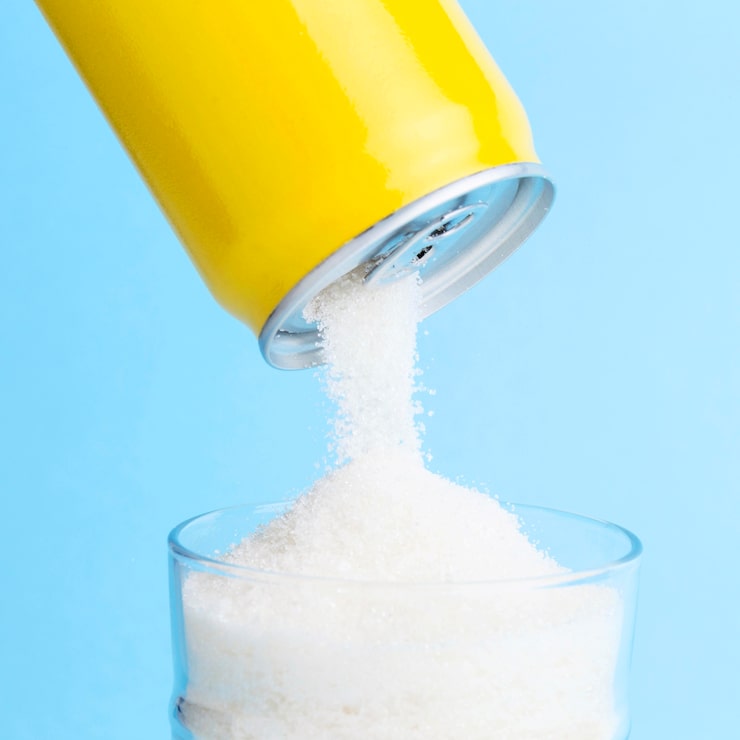No added sugar squash is a common choice for people trying to cut down on sugar. It’s often seen as a healthier option than sugary fruit juices or fizzy drinks. But is it really good for you? What’s in it, and are those ingredients healthy? How many calories does it have? Let’s take a closer look.
Ingredients
– Water is the main ingredient — squash is mostly water, so that’s expected.
– Juice from concentrate is usually next. This can be a mix of fruits like grape, blackcurrant and raspberry, or a single-flavour juice such as orange.
– An acidity regulator like sodium citrate is often added to control acidity and sometimes to help preserve the drink or stop juices from browning.
– Natural flavourings are used to give squash its taste; these can come from fruits, vegetables, spices or herbs.
– Sweeteners replace sugar in no added sugar squashes. Common ones are acesulfame potassium and sucralose; some brands (for example Ribena) use aspartame.
– Stabilisers such as pectin and cellulose gum help keep the liquid consistent and prevent separation.
– Colours like beta carotene are sometimes added to make the drink look more appealing.

Are these ingredients safe?
Most of these ingredients are generally considered safe, but there are possible side effects to be aware of. For example, acesulfame potassium has been linked to cancer in rat studies, and sucralose can cause gastrointestinal problems in some people.
Nutrition and calories
Nutritional values don’t vary much between brands. No added sugar squashes typically contain no fat, no protein and no fibre. They’re low in calories and have only small amounts of sugar and salt. Some brands may also provide tiny amounts of vitamins and minerals like potassium, vitamin C and calcium, but these amounts are small. You shouldn’t rely on squash for your nutrient needs — get vitamins and minerals from a varied diet including fruits, vegetables, whole grains and lean proteins. Always check the nutrition label and ingredient list to make sure a brand fits your needs.
Sugar content
Even without added sugar, squash can contain small amounts of natural sugars, mostly fructose from fruit extracts or juices. The sugar content varies by brand, but on average there’s about 0.2 grams of sugar per 100 ml of diluted no added sugar squash. That’s not much — a 250 ml serving would have under half a teaspoon of sugar.
Calories example
No added sugar squash is much lower in calories than sugary versions. For example, a 250 ml serving of Ribena Blackcurrant Squash has about 49 calories, while the No Added Sugar version has about 6 calories.
How it fits into daily fluid intake
The NHS recommends drinking six to eight glasses of fluid a day. This can include water, lower-fat milk and lower-sugar or sugar-free drinks such as fruit squash or diet soda. If you’re trying to drink more fluids, no added sugar squash can be a useful and tasty way to do it.
No added sugar vs sugar-free
They’re not the same. No added sugar squash still contains natural sugars from fruit extracts or small amounts from juices. Sugar-free drinks have had all sugars removed. Some no added sugar products use natural sweeteners like stevia or erythritol, which have very few or no calories and have minimal impact on blood sugar. If you have concerns, ask your doctor.
Suitability for babies and young children
Babies over six months can have water and occasionally unsweetened fruit juice, but breast milk or formula should be their main drink until they’re one year old. The NHS does not recommend reduced-calorie or no added sugar drinks for babies and young children because they can encourage a sweet tooth. So, don’t give your baby no added sugar squash.
People with diabetes
People with diabetes can drink no added sugar squash, but should be cautious. “No added sugar” doesn’t mean “no sugar,” and natural sugars in the drink can affect blood sugar. Check the nutrition label, limit intake, monitor blood glucose levels, and talk to your doctor about how it fits into your care plan.
Keto and carb counting
No added sugar squash isn’t automatically keto-friendly since it still contains some natural sugars. Check the label for carbs per serving and count that toward your daily limit.
Weight loss
Cutting calories helps with weight loss, so swapping sugary drinks for no added sugar squash can reduce calorie intake. However, artificial sweeteners may lead some people to eat more later to make up for the saved calories, so moderation is important.
Pregnancy
You should be careful with artificially sweetened drinks during pregnancy. Some studies link consuming artificially sweetened beverages in pregnancy to having a heavier baby. While no added sugar squash is generally considered safe, it’s best to limit how much you drink during pregnancy.
Slimming World
No added sugar squash is classed as a green light drink on Slimming World, meaning it’s considered a healthier option and is treated as free/unlimited.
Bottom line
No added sugar squash is a sensible choice if you want to cut down on sugary drinks and reduce calories. It’s low in calories and can add some vitamins, but it often contains artificial sweeteners and small amounts of natural sugar. Moderate your intake, check labels, and if you have diabetes, are pregnant, or are giving drinks to young children, talk to a healthcare professional for personalised advice. Overall, for most people it’s a healthier option than sugary drinks.